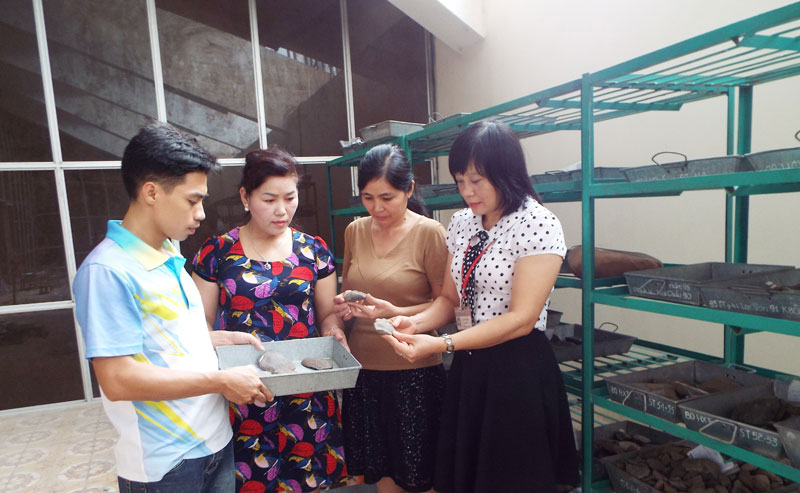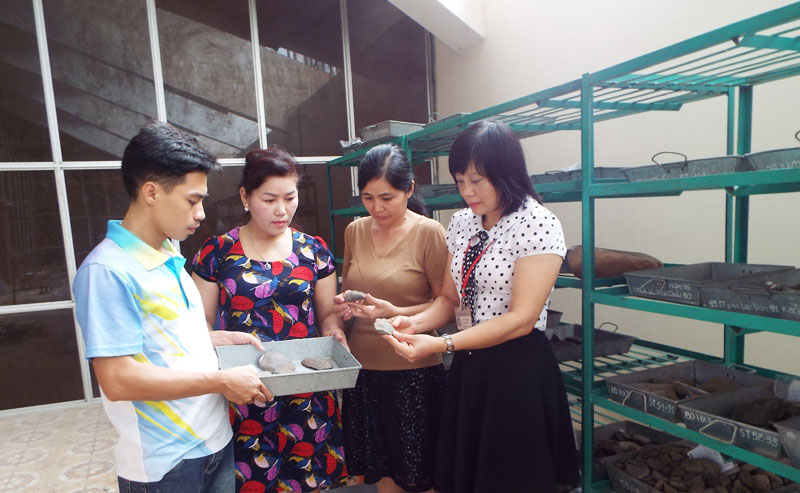
(HBO)- On the occasion of the 85th anniversary of the world recognition of the "Hoa Binh Culture”, Hoa Binh province will organise numerous activities to popularise and honour the unique archaeological values of the world-renowned Stone Age culture in the province. Hoa Binh Online reporters had a talk with Buil Ngoc Lam, Director of the provincial Department of Culture, Sports and Tourism and head of the organising board for commemoration activities.

Provincial museum staff arrange artefacts for an exhibition on the
occasion of the 85th anniversary of world recognition of "Hoa Binh
Culture”
Reporter: Could you give a general introduction about the "Hoa Binh
Culture”?
Mr. Bui Ngoc Lam: The term "Hoa Binh Culture” is used with two
meanings, one of which is the culture of all ethnic groups in Hoa Binh, and the
other is the archaeological culture.
Here we are talking
about the archaeological culture which dates back to the Stone Age, from
3,500-7,000 years ago.
The Hoa Binh Culture
was first discovered and studied by French woman archaeologist Madeleine Colani
in the years from 1926-1931. She also coined the term Hoa Binh Culture. In
1932, at the first conference on the prehistory in the Far East held in Hanoi,
world archaeologists agreed to adopt this term.
However, the Hoa Binh
Culture existed not only in Vietnam. In fact, it covered a large area in
Southeast Asia, but Vietnam was the place with the most relics of the culture,
so many foreign scientists considered the country as the birthplace of Hoa Binh
Culture. In Vietnam, Hoa Binh province is the place where the first relic of
Hoa Binh Culture was found, and it is also home to the most relics discovered
so far, that is why the province’s name was used to call the culture.
Reporter: On the 85th anniversary of world recognition of "Hoa Binh
Culture”, the province will organise many commemorative activities. Could you
please tell us about the meaning and significance of the anniversary?
Mr. Bui Ngoc Lam: Among commemorative events there will be an
exhibition on the Hoa Binh Culture, which will last through December. The
provincial library will host a display of books on the Hoa Binh archaeological
culture and the cultures of ethnic groups in Hoa Binh province. At the
provincial cultural palace, there will be a display of photos selected during
the Hoa Binh tourism photo contest in
2017. A scientific seminar on Hoa Binh Culture
will also be held here, along with an art performance and a demonstration of Mo
Muong.
Activities to celebrate
the 85th anniversary of world recognition of "Hoa Binh Culture” are
intended to popularise and honour the unique archaeological values of the
world-renowned Stone Age culture in Hoa Binh; honour the great contributions of
the French archaeologist Madeleine Colani who discovered and named the culture.
The activities also aim to foster the pride about the ethnic groups in the
province – the cradle of the Hoa Binh Culture and one of the cradles of human
kinds’ civilisation, and teach young generations about the local traditions.
Reporter: Thank you very much.
With an increasingly vibrant and widespread emulation movement aimed at building cultured residential areas and cultured families, Yen Thuy District has been making steady progress toward improving both the material and spiritual well-being of its people, while fostering a civilized, prosperous, beautiful, and progressive community.
Once lacking recreational spaces and community facilities, Residential Group 2 in Quynh Lam Ward (Hoa Binh City) has recently received attention for the construction of a new, spacious, and fully equipped cultural house. The project followed the model of state support combined with public contributions in both labor and funding.
The "All people unite to build cultural life" movement, which has been effectively integrated with Kim Boi district’s socio-economic development goals, is fostering a lively spirit of emulation across local residential areas, hamlets, villages, public agencies, and enterprises. In addition, through the initiative, traditional cultural values are being preserved and promoted, while community solidarity and mutual support in poverty reduction and economic development are being strengthened.
A working delegation of the Hoa Binh provincial People’s Committee led by its Permanent Vice Chairman Nguyen Van Toan on June 11 inspected the progress of a project to build the Mo Muong Cultural Heritage Conservation Space linked to tourism services in Hop Phong commune, Cao Phong district.
Born and growing in the heroic land of Muong Dong, Dinh Thi Kieu Dung, a resident in Bo town of Kim Boi district, in her childhood was nurtured by the sweet lullabies of her grandmother and mother. These melodies deeply imprinted on her soul, becoming an inseparable part of her love for her ethnic group's culture. For over 20 years, this love for her hometown has driven Dung to research, collect, and pass down the cultural values of the Muong people to future generations.
In the final days of May, the Ethnic Art Troupe of Hoa Binh Province organized performances to serve the people in remote, mountainous, and particularly disadvantaged areas within the province. These were not just ordinary artistic shows, but they were the meaningful journeys aimed at spreading cultural values, enhancing the spiritual life of the people and contributing to the preservation of ethnic minority cultural identities.



